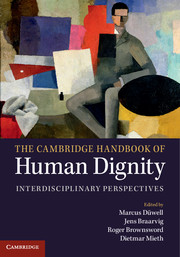Book contents
- Frontmatter
- Contents
- List of contributors
- Foreword
- Why a handbook on human dignity?
- Acknowledgments
- 1 Human dignity from a legal perspective
- 2 Human dignity: concepts, discussions, philosophical perspectives
- Part I Origins of the concept in European history
- Part II Beyond the scope of the European tradition
- Part III Systematic conceptualization
- Part IV Legal implementation
- Part V Conflicts and violence
- 47 Human dignity and war
- 48 Treatment of prisoners and torture
- 49 Human dignity and prostitution
- 50 Human dignity, immigration and refugees
- Part VI Contexts of justice
- Part VII Biology and bioethics
- Appendix 1 Further reading
- Appendix 2 Universal Declaration of Human Rights
- Index
- References
47 - Human dignity and war
from Part V - Conflicts and violence
Published online by Cambridge University Press: 05 March 2015
- Frontmatter
- Contents
- List of contributors
- Foreword
- Why a handbook on human dignity?
- Acknowledgments
- 1 Human dignity from a legal perspective
- 2 Human dignity: concepts, discussions, philosophical perspectives
- Part I Origins of the concept in European history
- Part II Beyond the scope of the European tradition
- Part III Systematic conceptualization
- Part IV Legal implementation
- Part V Conflicts and violence
- 47 Human dignity and war
- 48 Treatment of prisoners and torture
- 49 Human dignity and prostitution
- 50 Human dignity, immigration and refugees
- Part VI Contexts of justice
- Part VII Biology and bioethics
- Appendix 1 Further reading
- Appendix 2 Universal Declaration of Human Rights
- Index
- References
Summary
War as moral evil
War as sustained combat between political communities is a moral evil (Walzer 2006; Levy and Thompson 2010). War signals the breakdown of law and order and develops a deadly dynamic of its own. Conflicts are no longer settled by moral reasoning, legal adjudication or political negotiation, but by well-organized armed forces. War always goes along with death and destruction. Troops are moved strategically to overcome violent resistance and to defeat an enemy. As a rule, not only fighters are victimized on the battlefield, but entire societies suffer. The number of non-combatants dying from the direct and indirect consequences of sustained combat such as economic shortages, famines, displacement or disrupted healthcare and social security systems by far exceeds military casualties. Additionally, warfare goes along with the categorization, and, in most cases, dehumanization of opponents. Adversaries are no longer considered individual human beings but enemies who may be killed without further justification. Given the recent increase in ethnic conflicts, the traditional distinction between combatants and non-combatants blurs even further. War was never restricted to the battlefield, but today's wars more than ever target civilian populations. Depending on the severity of the fighting and the number of atrocities committed, it takes a generation or more to overcome the social disruptions of war and to re-establish a robust peace among former combatants and their successors.
Human dignity, by contrast, requires the peaceful settlements of disputes among as well as within societies (Gewirth 1996: 1–70; Steigleder 1999: 157–75). Individuals and groups should be treated according to established human rights standards. They are entitled to life in peace and their legitimate interests should be protected by appropriate institutions. The distribution of rights and obligations within as well as among societies should be clearly specified and generally respected. In cases of transgression, a public authority should intervene to restore justice and to punish the offender if appropriate and reasonable. As such, the settlement of conflicts by well-recognized human right standards contradicts their settlement by the use of well-organized armed forces. In fact, human dignity requires the abrogation of war.
- Type
- Chapter
- Information
- The Cambridge Handbook of Human DignityInterdisciplinary Perspectives, pp. 439 - 445Publisher: Cambridge University PressPrint publication year: 2014
References
- 2
- Cited by

